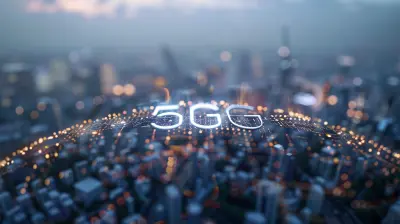G and the Future of Financial Technology
9 July 2025
The world is changing faster than ever before. With each technological advancement, industries are transformed, and sometimes, they’re even turned upside down. Financial technology, or fintech as it’s popularly known, is no stranger to this trend. And now, with the arrival of 5G, we’re on the cusp of a revolution that could change the way we handle money, banking, and investments forever.
But what does 5G have to do with fintech, really? And how will it impact the industry in ways that perhaps we can’t even fully predict yet? Buckle up, because we’re about to dive into the exciting world of 5G and the future of financial technology.

What is 5G Anyway?
Before we get into the nitty gritty of fintech, let’s quickly break down what 5G actually is. In simple terms, it's the next generation of mobile wireless technology following 4G. While 4G was a game-changer in its own right, 5G takes things to a whole new level. We’re talking speeds up to 100 times faster than 4G, ultra-low latency (that's the amount of time it takes for data to travel from one point to another), and the ability to connect more devices simultaneously.In essence, 5G is the key to unlocking the true potential of technologies that require massive amounts of data to be transmitted at lightning speeds. Think self-driving cars, smart cities, and of course, more advanced financial technologies.

The Current State of Fintech
Financial technology has already made some pretty big strides. Just look at how we pay for things today compared to a decade ago. Mobile payments, peer-to-peer lending, robo-advisors, and cryptocurrencies are all part of the fintech wave that has shaken up traditional financial systems.Banks are no longer the sole gatekeepers of financial transactions. With fintech startups popping up left, right, and center, consumers now have more options than ever to manage their money. But while fintech has made things faster and more convenient, there are still some limitations due to the current infrastructure.
Enter 5G.

How 5G Will Revolutionize Fintech
1. Faster Transactions and Real-Time Payments
Let’s start with the obvious – speed. With 5G, transactions that once took seconds or even minutes will now happen in the blink of an eye. Have you ever tried transferring money between banks or even countries and felt like it takes forever? That's largely due to network constraints.With 5G, these delays could be a thing of the past. Real-time payments will truly feel instantaneous. Imagine splitting the bill with friends at a restaurant and the money is transferred immediately, no matter which app or bank you're using. Or how about businesses receiving payments from clients halfway across the world without any delays? This is where 5G can really shine.
2. Improved Security and Lower Fraud Risks
Security is a huge concern in fintech, and rightly so. When it comes to handling people’s money, you can’t afford to take risks. While current encryption methods and security protocols are robust, they can always be improved.5G will enable more sophisticated authentication methods, such as biometric identification, facial recognition, and even behavioral analysis. These advanced technologies will become more reliable and seamless with the improved speed and low latency of 5G networks.
Additionally, 5G's enhanced bandwidth will allow financial institutions to run more complex real-time fraud detection algorithms. These algorithms could analyze vast amounts of data in real time, flagging suspicious activities almost instantly and reducing the risk of fraud.
3. The Rise of Edge Computing and Decentralization
One of the most exciting aspects of 5G is how it ties into edge computing. Edge computing essentially means processing data closer to where it’s generated, rather than having to send it all the way to a centralized server.For fintech, this is huge. Why? Because it brings decentralization to a whole new level. With 5G, edge computing can allow financial institutions to process transactions, run algorithms, and make decisions locally – all in real-time.
This will reduce the dependency on large, centralized data centers and make fintech services more resilient. Not to mention, it could pave the way for more decentralized financial systems (think blockchain and DeFi) to thrive in a 5G-powered world.
4. Enhanced Customer Experiences
Let’s face it, no one likes waiting around for a slow app to load or being stuck on hold with customer service. 5G technology can help fintech companies enhance user experience by making their apps faster, more responsive, and more intuitive.Imagine interacting with a virtual financial advisor in real time through augmented reality (AR) or virtual reality (VR) without any lag or delays. Or how about receiving personalized financial advice through AI-based chatbots that can analyze your financial data faster than ever before?
With 5G, fintech companies will be able to offer smoother, faster, and more personalized experiences, which will ultimately lead to higher customer satisfaction.
5. Boosting Financial Inclusion
One of the promises of fintech has always been to democratize access to financial services. However, there are still millions of people around the world who remain "unbanked" or "underbanked." Many of them live in rural or remote areas where internet connectivity is weak or non-existent.5G could change that. With its ability to provide high-speed internet in areas that were previously underserved, 5G could bring fintech services to people who never had access to them before. This could be life-changing for individuals and small businesses in developing countries, opening up new opportunities for economic growth.
Whether it's mobile banking, peer-to-peer lending, or micro-investment platforms, 5G can help connect more people to the financial tools they need to thrive.
6. Accelerating Blockchain and Cryptocurrencies
Blockchain and cryptocurrencies have already made waves in the financial world, but their full potential is often hindered by the limitations of current network infrastructures. The decentralized nature of blockchain requires a lot of data to be processed and shared across multiple nodes, which can sometimes slow things down.With 5G, the increased speed and reduced latency will enable blockchain networks to operate more efficiently. This could lead to faster transaction times, lower fees, and more widespread adoption of blockchain-based financial technologies.
Cryptocurrency trading, for example, could become more seamless with 5G, allowing traders to execute trades instantly without worrying about network delays. Similarly, decentralized finance (DeFi) platforms could become more robust and scalable in a 5G-powered world.
7. The Internet of Things (IoT) and Fintech
Another exciting aspect of 5G is its ability to support the Internet of Things (IoT). IoT refers to the network of connected devices – from smart refrigerators to wearable fitness trackers – that can communicate with each other and with us.In the context of fintech, IoT could open up entirely new possibilities. For example, imagine a world where your connected car automatically pays for gas as you fill up, or your smart fridge orders groceries and pays for them without you lifting a finger. These kinds of automated, seamless transactions will only be possible with the low latency and high-speed connectivity of 5G.
Furthermore, IoT devices could help financial institutions gather more data on consumer behavior, which could lead to more personalized financial products and services.

Challenges and Concerns
Of course, 5G isn't without its challenges. For starters, there’s the issue of infrastructure. While 5G is rolling out in many parts of the world, it will take time before it’s available everywhere. There’s also the question of cost – upgrading to 5G-compatible devices and networks won’t come cheap, especially for smaller fintech startups.Then there's the issue of security. While 5G promises improved security, it also opens up new potential vulnerabilities. With more devices connected to the network, there are more entry points for cyber attackers. Ensuring that 5G networks are secure will be critical for the fintech industry moving forward.
Final Thoughts
It’s clear that 5G holds tremendous potential for the future of financial technology. From faster transactions to improved security, enhanced customer experiences, and greater financial inclusion, the possibilities are endless. While there are challenges to overcome, the benefits far outweigh the risks.As 5G continues to roll out globally, we can expect to see a new wave of innovation in fintech that will reshape how we manage, spend, and invest our money. And who knows? The next big fintech revolution could be just around the corner – powered by the blazing speed of 5G.
all images in this post were generated using AI tools
Category:
5g TechnologyAuthor:

Reese McQuillan
Discussion
rate this article
2 comments
Rebecca Dodson
Great insights on the evolving landscape of financial technology! I'm particularly intrigued by how G's innovations could enhance accessibility and security in banking. Excited to see what the future holds!
November 13, 2025 at 5:11 AM

Reese McQuillan
Thank you! I'm glad you found the insights valuable. G's innovations truly have the potential to transform accessibility and security in banking. Exciting times ahead!
Sonya Maddox
With G leading the charge, the future of financial technology promises to be more than just innovation—expect a revolution that redefines how we interact with our money.
July 12, 2025 at 11:04 AM

Reese McQuillan
Thank you! I'm excited about the potential for a transformative shift in how we manage our finances with G at the forefront.


